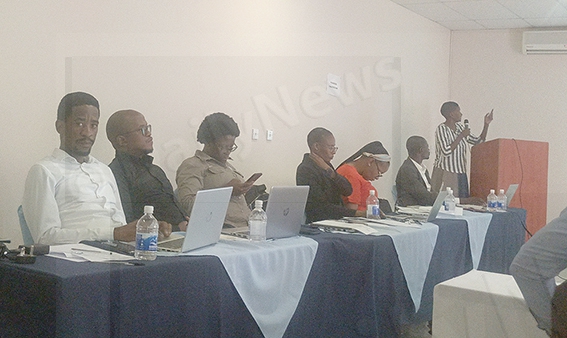Experts preach energy efficiency
25 Nov 2024
Officials from the Department of Energy have forged collaboration and networking with councils towards enhancing energy efficiency and conservation in district operations.
Energy efficiency and conservation, they said, were critical in reducing operational costs and promoting sustainable development.
Energy experts made the remarks during a recent one-day workshop held in Maun, aimed to equip some implementers of energy efficiency and conservation initiatives from North West and Chobe district councils on the principle of energy efficiency and conservation as well as to demonstrate the importance of energy management in reducing operation costs.
The workshop also provided practical tools and strategies for implementing energy efficiency measures and encouraged adoption of energy-efficient technologies and practices in district operations.
One of the workshop facilitators, who is also the principal energy engineer, Mr Simasiku Mukwaso said management of energy resources was essential not only for cost-savings, but also for setting a precedent in environmental stewardship within the community.
District council officials and stakeholders who were equipped with the necessary skills and knowledge, he said, could collectively contribute to a more sustainable and cost-effective future.
“It has been proven scientifically that to achieve energy efficiency, the government has to lead by incorporating energy efficiency measures into its facilities,” he added.
The government, he said, had to use top-down approach to establish policies and then engage implementers who would set targets to reduce energy consumption.
Participants were sensitised on how they could conserve and use energy, especially electricity efficiently and were told that energy conservation was important as it helped in saving costs and prevented pollution and global warming.
They were advised on developing energy conservation plans and behaviour change strategies to reduce energy use as well as monitor and evaluate energy consumption.
Energy officer, Ms Boitumelo Mogale apprised participants on the National Energy Policy that guides the energy sector and outlined government’s intentions for an effective development and management of the energy sector.
The goal of the policy is to ensure energy security and improve access to reliable and adequate supply of energy in order to facilitate a sustainable and low carbon economic development.
The policy, she said, gives a framework for the principles, prospects and choices that were required to optimise the role of energy for sustainable economic development.
Furthermore, she said the policy contributed towards achievement of Vision 2036 and the National Development Plan 11, adding that Botswana aspired to become an upper income country and as such, the policy promoted economic diversification.
“The government is committed to promote energy efficiency and conservation and has laid foundation for the same by creating some favourable policies and undertaking other supportive actions,” she emphasised.
Ms Mogale also indicated that Botswana had the potential to generate enough energy, especially solar and export excess to other countries and eventually contribute to the Gross Domestic Product.
The country, she said, had been importing 80 per cent electricity until 2012 and an increased trend of domestic generation was projected in the latest Integrated Resource Plan (IRP) which is a 20-year roadmap for power generation and takes on board different technologies for power generation.
No one, she said, should be left behind in accessing modern energy services, adding that the policy also considered the low-income and marginalised communities.
Current demand of electricity, she said stood at 4505.97GWh and was expected to grow to 8637GWh by 2040, adding that the national electricity access rate stood at 73.9 per cent.
Energy engineer, Mr Gaamangwe Matlhare shared some renewable energy projects outlined in the IRP, which he said were aimed to meet the local demand and enable exportation of excess.
He also mentioned some project beyond the IRP such as biogas projects, the off-grid solar and rooftop solar programmes. ENDS
Source : BOPA
Author : Esther Mmolai
Location : MAUN
Event : workshop
Date : 25 Nov 2024







